No gear for camping? 10 other ways to stay in the outdoors
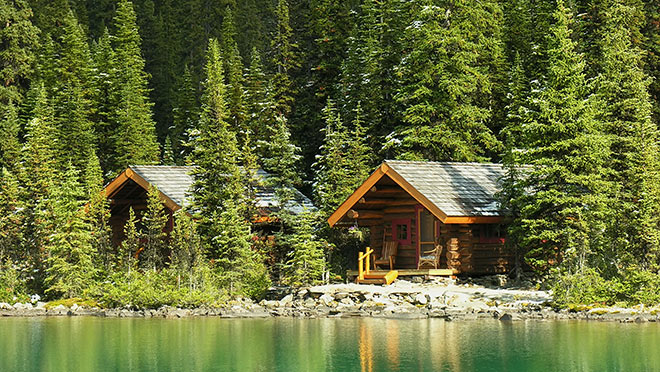
From gear rentals to yurts, guided trips and RV rentals, there's an option for you
If you're a seasoned camper, you've probably already booked your trips and/or are lined up to compete for a spot via B.C.'s Discover Camping rolling window reservations. But perhaps you're a wannabe camper who doesn't have the gear or experience to get it done. If this is you, read on.
Roughing it as a backpacker in the back country, or "car-camping" in BC Provincial Parks, has only grown in popularity since the start of the COVID-19 pandemic. Getting back to nature will be at the top of many must-do lists this summer, too.
The good news is that there are a lot of options out there. The caveat is that you'll need to act fast, and your only choice in the short-term is to travel within your region. Please consult B.C.'s updated information on COVID-19 travel restrictions, which currently include a ban on all non-essential travel through May 25, 2021 and could be extended.
Reservations versus first-come, first-served
Before we get into the non-traditional camping options out there, let's talk about getting a camping spot. The key is to know that for the mega-popular BC Parks system, most campsites will be booked the first day reservations become available (two months from the first day you want to camp). In other words, you could book today (May 5) for an available site anytime up until July 5, but if you can't start your vacation until July 6, you'll have to wait a day to book.
Here's a pro tip: Summer weekends are almost always booked solid at the popular sites, so consider avoiding weekends in favour of weekday travel. If you're limited in the number of weekdays you can use for your tip, try to at least take off a day or two before the weekend. That way, you can book via Discover Camping (say, for three nights instead of two), starting on the Thursday before a weekend. You'll also beat the Friday afternoon rush hour.
Kids not in the mix? Wait until September when school is back. You're likely to still have good weather, better availability, and no crowds.
BC Hydro's recreation sites, on the other hand, don't allow for reservations. It's a first-come, first-served option that carries an element of risk: you might arrive at a popular destination such as Jones Lake east of Chilliwack only to discover that there are no spots available.
Again, at least until COVID-19 non-essential travel restrictions are eased, stay close to home.
Here's what else you should know about BC Hydro's recreation sites:
- They're more rustic than BC Parks, which often means pit toilets for overnight campers, little or no access to potable fresh water, and the need to bring your own firewood if you plan on having a campfire. Several day-use sites, however, have flush toilets.
- Until COVID-19 restrictions are relaxed, only visit recreation sites in your community, follow the province's physical distancing requirements, bring hand sanitizer/sanitizing wipes with you, and please stay home if you're sick.
- Because the rec sites are mostly located on reservoirs, be aware that water levels can change suddenly. Sirens and strobe lights at some sites may be used to alert you.
- Get to know everything about BC Hydro's rec sites, and safe camping in general, in our 10 camping tips to ensure it's fun and safe story.
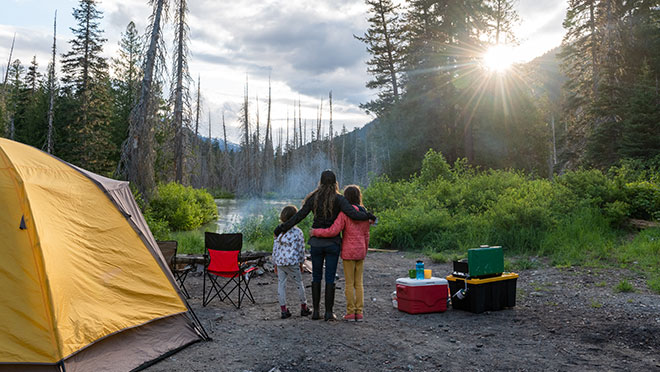
Rent your camping gear
Buying a tent, cooking gear, a cooler, and lighting equipment for a camping trip is going to set you back anywhere from a few hundred dollars for low-end stuff to one or two thousand for the really good stuff. And then you're going to have to find a place to store it year-round.
That's why camping gear rentals are on the rise, with Vancouver-based Packlist leading the way. They offer individual items such as tents ($30 to $40) and camp stoves ($10) to car camping and backcountry packages starting at less than $100. They'll also deliver it to you, in a sturdy storage bin, the day before your trip begins.
Other options include West Coast Gear on Vancouver Island, and you can also opt for UVic rentals if you're a CARSA member.
Book an equipped Parks Canada campsite
Partially in a bid to introduce new Canadians to camping, Parks Canada has for years offered a limited number of equipped campsites in several provinces. And while B.C. isn't on the list, once COVID-19 travel restrictions are eased, we can take advantage at Alberta parks including Banff, Elk Island and Rocky Mountain House. And B.C. does include four sites that are part of the similar oTenTik program (see below).
Starting at $70 a night, the equipped tent sites include a 4- or 6-person tent (depending on location), with sleeping pads, camp stove, lantern, picnic table and fire pit, and can include camping chairs and kitchen gear. You'll need to bring along sleeping bags, food and drink, in some cases cooking gear, along with flashlights, rope, matches, and personal items.
Go to Parks Canada's equipped camping site for details and for reservation information.
Parks Canada's oTenTik program is a step up in comfort, offering stays in raised-platform A-frame cabins equipped with beds, furniture and even heating. Some sites can also include decks/outdoor furniture, a cook shelter, barbecue, fire pit and a USB port for charging devices. B.C. sites include Pacific Rim National Park, Kootenay National Park, Fort Langley National Historic Site, and Fort Rodd Hill National Historic Site, and start at $92 per night.
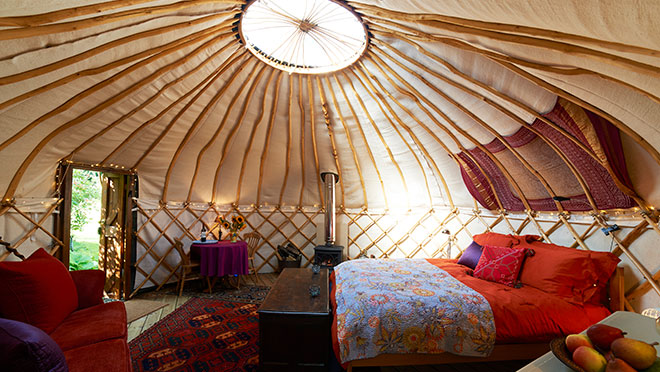
Stay in a yurt
The modern version of the yurt borrows from original Central Asian nomad housing and is usually a covered, round and open space on a raised platform, with room for four to six people. Several BC Parks have yurt rentals, and there an abundance of other options, including well-equipped private rentals on glampinghub.com and Airbnb (Google 'airbnb yurt BC') at locations across the province.
Yurts can range from small and basic to super comfortable and roomy enclosures such as this Elven Sanctuary near Courtenay.
Find a cabin in the woods
Depending on how much you're willing to spend, there's a wide variety of tempting options on the likes of vrbo.com, glamping.com, and Airbnb.com.
This little house on rural acreage in the Deadman Creek area between Cache Creek and Kamloops includes room for three with a kitchen, dryer, and even wifi.
For those into meditation, there's a custom dome in Armstrong that includes an option to arrange for wood oven pizza.
And it's hard to beat waterfront property such as a swim-in cabin on White Lake near Sorrento, or a luxurious oceanfront home near Sooke.
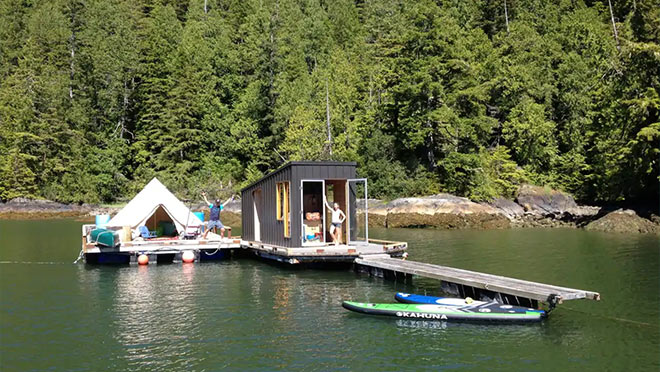
Stay on the water
Look hard enough and you'll find some customized on-the-water vacations ranging from houseboats on Shuswap Lake to a lagoon float camp off Tofino that features a tent for up to four, a wood-fired sauna and a rowboat to explore a secluded bay.
There are also hosted sailing adventures, such as this popular Gulf Islands rental on a 48-foot sloop in which the captain supplies the sailing smarts and teaches you the basics while he's at it.
Take a guided backpacking or paddling adventure
Outward Bound generally focuses on introducing teenagers to the wild, but also features some over-19 backpacking trips such as a mindfulness-themed 7-day backpacking expedition for those 25-plus.
One of B.C.'s hidden gems, the Bridge River region northeast of Whistler is home to Tyax Adventures, which uses a network of equipped campsites in the back country for guided hiking, horse-packing, and biking vacations, including the popular option of flying in to the remote area via float plane from Whistler.
You can also take a multi-day glamping vacation by kayak in the Broken Islands, trips that supply accommodation, kayaks and equipment, and gourmet meals.
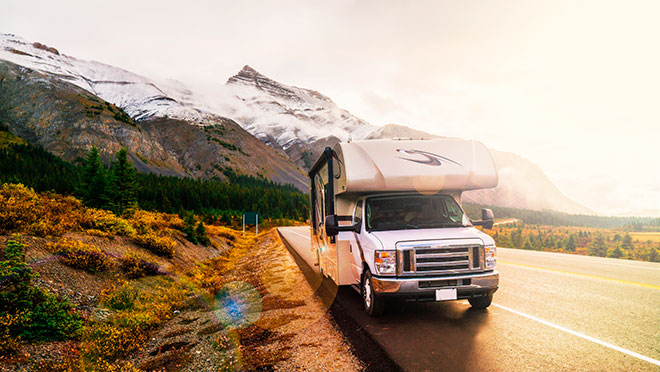
Rent an RV
The Oscar best picture winner Nomadland is a sobering look at the life of the RV nomad in the U.S., but RV camping can be a comfy, customizable "camping" option in B.C. The easiest option is to rent a small mobile home that's relatively easy to drive and is ideal for stops at B.C.'s campsites.
There are two main options for renting RVs. The more reliable, pricier option is to go with an RV rental specialty business such as Canadream. But more affordable private rentals are now available, from different cities and towns across B.C., via outdoorsy.com and rvezy.com. Make sure to do your homework, including reading reviews and all the fine print, and book your campsites well in advance.
Stay in a hotel and do day trips
The advantages of opting for a hotel are that you've got a place to sleep that you don't need to set up, and many include a kitchen. If you're short on time for your getaway, you won't waste any setting up camp – you can just head out early each day to hike, fish, cycle, whatever it is you like to do.
The disadvantage. You're going to miss those evenings around the campfire, and the delight of sleeping in a tent in the woods.
Tag along with a friend who has the gear and the experience
A lot of seasoned campers, including backpackers, love sharing their experiences and bringing newbies into the fold. If you have friends invite you on a trip, jump at the opportunity. But be prepared, pay attention to COVID-19 travel and safety restrictions, help out a lot, and pitch in a little cash (or pay for food and/or gas). That collection of camping gear is not cheap.
Ditto for staying at a friend's cabin: helping build or repair stuff, prepping meals and throwing in some cash, is the path to a great vacation (and more future invitations).
Stay at a fishing resort
A stay at one of B.C.'s lakeside fishing resorts can be a rustic experience complete with a fire pit, perhaps an outhouse, and in many cases, a waterfront view. If you don't have fishing experience, do your homework and buy, rent, or borrow some basic gear.
The Freshwater Fisheries Society of BC is a great place to start for the beginner, as it offers half-day introductory fishing courses and has a rod loaner program.
If you're going to operate a boat with a motor, you'll also need to take an online boat safety course. Otherwise rent a rowboat, kayak or canoe. Fishing in B.C.'s lakes also requires a freshwater fishing license, and there are specific skills and safety guidelines involved. Ideally, make your trip with a seasoned angler who may also be able to supply you with the gear.
Enter to win
If the current travel restrictions lift, exploring the outdoors will be on a lot of summer to-do lists. We want to help you get geared up for camping with a new YETI Cooler. Find us on Instagram for your chance to win. Read the contest rules [PDF, 140 KB].